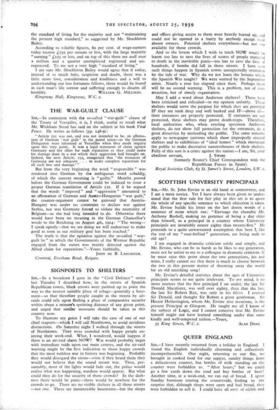SIGNPOSTS TO SHELTERS
SIR,—In a broadcast I gave in the " Civil Defence " series last Tuesday I described how, in the streets of Spanish Republican towns, black arrows were painted up to point the way to the nearest suitable place of refuge—generally a base- ment—so that therefore people caught in the streets by air- raids could rely upon finding a place of comparative security within about a minutes sprinting distance of any given point, and urged that similar measures should be taken in this country now.
To illustrate my point I will take the case of one of our chief seaports—which I will call Northtown, to avoid invidious distinctions. On Saturday night I walked through the streets of Northtown. They were crowded with happy people en- joying their week-end. What, I wondered, would happen if there is an air-raid alarm NOW? War would probably begin with immediate raids upon our main centres, and the air-raid warning might be the first indication to those happy crowds that the most ruthless war in history was beginning. Probably they would disregard the sirens—even if they heard them they would not believe that the sound meant war. Then, pre- sumably, most of the lights would fade out, the police would realise what was happening, wardens would appear. But what could they do for the security of those crowds? In the dark- ness there would be panic—there would be nowhere for the crowds to go. There are no visible shelters in all those streets —not one. There are innumerable basements—but the shops and offices giving access to them were heavily barred up, and could not be opened in a hurry by anybody except their absent owners. Potential shelters everywhere—but not one available for those crowds.
And so the lesson which I wish to teach NOW would be learnt too late to save the lives of scores of people trampled to death in the inevitable panic—too late to save the lives of hundreds, if bombs did fall in those streets. I have seen such things happen in Spanish towns unexpectedly overtaken by the tide of war. Why do we not learn the lessons which the Spanish War taught? We were warned by the September crisis. Nearly a year has elapsed since then. Perhaps there will be no second warning. This is a problem, not of con- struction, but of timely organisation.
May I add a word about Anderson shelters? These have been criticised and ridiculed—in my opinion unfairly. These shelters would serve the purpose for which they are provided IF they are sunk deep and well banked and IF—above all— their entrances are properly protected. If entrances are not protected, these shelters may prove death-traps. Therefore, local authorities who, when erecting specimen Anderson shelters, do not show full protection for the entrances, do a great disservice by misleading the public. The same remarks apply to newspaper cartoons which show improperly erected shelters and to exhibitions of " ideal homes " which encourage the public to make decorative summerhouses of their shelters. Folly of this sort is a crime against the nation.—I am, Sir, your (formerly Reuter's Chief Correspondent with the Republican Forces in. Spain).
Royal Societies Club, 63 St. James's Street, London, S.W. r.








































 Previous page
Previous page